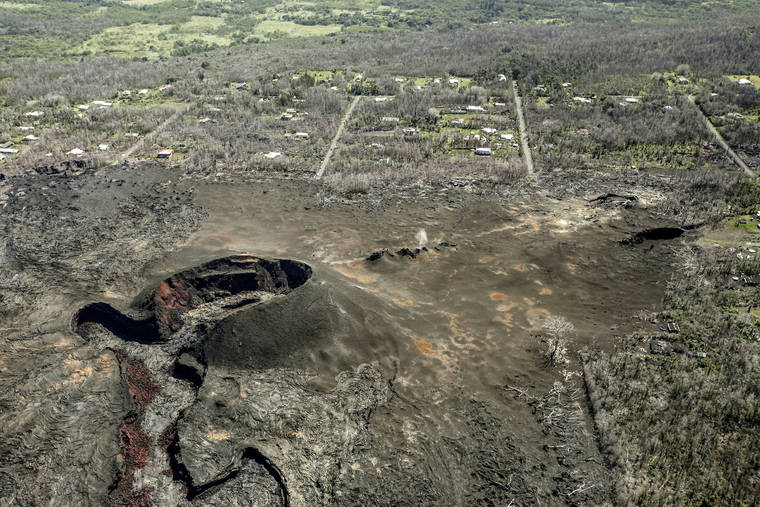HILO — A discussion during a meeting Thursday night in Pahoa about what to name fissure 8 revolved mostly around what deity it should reflect.
The public meeting at the Pahoa Neighborhood Facility, attended by about 30 people, was organized by a permitted interaction group the state Board on Geographic Names formed to receive public input. So far, 16 proposed names from 14 applicants have been officially submitted.
Seven people gave their input, with some making the case for the fissure in Leilani Estates, the eighth and most powerful vent to start during last year’s Kilauea eruption, to be named after Ailaau, a male volcano deity that predates the arrival of Pele.
Puna resident Pi‘ilani Ka‘awaloa, one of the people proposing the name “Ahuailaau,” said this eruption had a different energy than recent volcanic events. Ahu can mean mound or something heaped up, in addition to shrine, altar or cairn, according to the proposal.
“The smell was different,” she said. “The force of the lava was different. The arrogance, the maleness, of this lava was different, and each and every one of us felt the difference.”
The name was submitted by Kalani Makekau-Whittaker on behalf of Ka‘awaloa and two others.
The proposal states the collective experience of numerous cultural practitioners “who have been face-to-face with the lava on multiple occasions has been filled with sightings, visions and communication with Ailaau. He has appeared in dreams of a number of cultural experts and there was a sighting of him in human form at the Puuhonua o Puna.”
Several others at the meeting said they were supportive or comfortable with naming the feature after the lesser-known deity.
But not all agree with that interpretation.
Kepa Maly, a Hawaiian cultural consultant, was interviewed in a 2001 Honolulu-Star Bulletin article regarding evidence of an explosive eruption at Kilauea around 1000 A.D. In the article, he suggested the eruption might have caused Hawaiians to change their view of the volcano, and may have led to the rise of Pele.
When reached by phone on Friday, Maly said that Native Hawaiian lore gives Ailaau, whose name means “forest eater,” a less violent reputation than Pele, who caused him to flee the volcano. He doesn’t see why Pele can’t be associated with such a powerful event.
“Look at the chant that comes with Pele,” Maly said.
“Why would we today in our time consider these (events) to be other than the manifestation of Pele saying — ‘No forget me. I am here.’?”
Even though the eruption was highly destructive — 716 structures were destroyed — Ka‘awaloa said it should also be seen as an opportunity to heal or restore.
“We want to heal our community,” she said. “We have a new opportunity to make this pono, to make this right.”
She also urged others to find out what the eruption means to them.
Kaonohiokalani Jeremiah of Leilani Estates said she agreed with the association with ‘Ailaau. And not just because of the damage the eruption caused, but of the opportunities it creates for the future.
“We rise into new beginnings,” she said at the meeting.
Members of the Board on Geographic Names say this is the first time they’ve reached out to the public to name a new feature. They also say it’s a process they want the community to lead.
At the meeting, they mostly took a back seat to those who volunteered to speak.
“We really look to the community to guide us,” said Marques Marzan, board chairman and PIG member.
The deadline to submit proposals is June 30. Submissions can be made online: https://planning.hawaii.gov/gis/hbgn.
Marzan, a cultural advisor to the Bishop Museum, said another community meeting will be held, likely in August.
The PIG has until the end of the year to make a recommendation to the board.
Names for other features can also be submitted, though there is no deadline for those.
Hilo Council member Sue Lee Loy, who introduced a resolution last year urging a public naming process for the volcanic feature, said Thursday morning during an informal gathering of participants that this is a “true beginning of what will be a very long story to tell.”
Larry Kimura, associate professor at the University of Hawaii at Hilo’s College of Hawaiian Language, proposed one that covers all of the 24 fissures from last year’s eruption: Papalauahi.
It means earth of numerous volcanic eruptions.
“It all happened as one eruption,” he said.
Kimura said naming fissure 8 after Ailaau would be a good way to commemorate a “very substantial deity.”
Based on the primary sources he found, he said he couldn’t comment on whether Ailaau should be seen as male or female.
“The documentation I found had no information on gender or behavior,” Kimura said.
When it’s time to make a decision, Marzan said the board will hold its meeting in Pahoa.
Email Tom Callis at tcallis@hawaiitribune-herald.com.
Proposed names
• Puu Leilani (named for the subdivision, Leilani Estates, where the fissure is located).
• Puuoailaau (Hill of Ailaau).
• Keahiluawalu O Pele (no meaning provided. Submitter said it came to them in a dream).
• Puu Kupaianaha (Puu = hill; Kupaianaha = surprising, strange, wonderful, marvelous).
• Ahuailaau (Ahu = mound/shrine/altar or cairn; ‘Ailaau = a volcano deity).
• Puu O Luku (hill of destruction).
• Hanaiana (creation).
• Enoho (regeneration).
• Hou Hoomaka (new beginnings).
• Keahilapalapa (spreading or blazing fire).
• Kekohehoohenonohoikalaiopuna
paiaalaikahala (cherished crease occupying the calm of Puna of the forest bower fragrant with pandanus).
• Ke Ahi Enaena (raging fire).
• Luana-Lani (named after Luana Street in Leilani Estates).
• Papalauahi (earth of numerous volcanic eruptions; proposed name for all 24 fissures).
• Pohaha (a reduplicative of paha, which can mean breaking forth, bursting, cracking and volcanic ejecta of any kind).
• Pohakaena (exploding rage).



